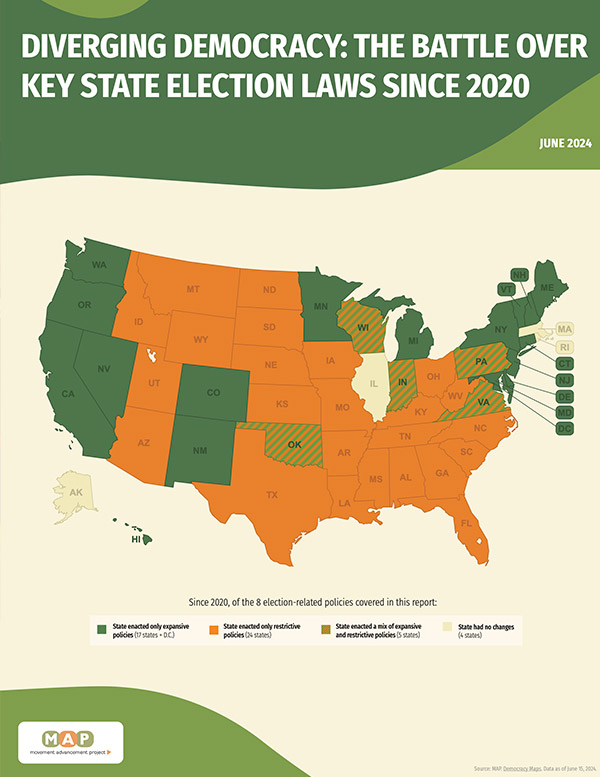"Diverging Democracy: the Battle Over Key State Election Laws Since 2020"Download PDF
Over the last four years, a number of policy trends have impacted not only how voters cast their ballots, but also the security and independence of our elections. These emerging trends are poised to significantly impact election outcomes, voter turnout, and public confidence in the electoral process. A new report from MAP, Diverging Democracy: the Battle Over Key State Election Laws Since 2020, finds that while some states have emphasized voter access and expanding opportunities for voters to become registered, other states have prioritized restrictive measures that undermine the democratic functioning of elections. MAP's new analysis shows:- Since 2020, only 18 states have become more expansive in terms of the policies tracked in this report that provide equal access to the ballot and combat violence and divisiveness.
- Since 2020, almost half of all states (24) have become more restrictive, signifying their prioritization of efforts to limit access to voting.
- An additional five states have enacted both expansive and restrictive policies since 2020.
Using MAP’s unique Democracy Maps and bill tracking, this report shows the progression of these opposing trends in recent years and forecasts how this continued polarization will likely impact the upcoming 2024 election—and American democracy for years to come.
EXPANSIVE POLICIES
Today, only 36% of eligible voters live in states that have enacted at least one of the expansive laws listed below and have not enacted any of the four restrictive laws covered in this report. ✔ Protecting Election Workers from Threats and Intimidation (view Democracy Map)- 16 states & D.C. have enacted new laws that seek to explicitly protect state and local election officials.
✔ Bans on Guns in Polling Places (view Democracy Map)- Seven states have passed total prohibitions on the possession of guns in polling places, and four states have enacted partial prohibitions since 2020.
✔ Automatic Voter Registration (view Democracy Map)- Automatic voter registration (AVR), which automatically registers eligible voters through their interactions with state agencies, has the potential to substantially improve participation in and the health of our democracy. Since the 2020 election, seven states have either expanded or adopted AVR for the first time. As a result, a majority of voters now live in states (24 + D.C.) with some form of AVR.
✔ State Voting Rights Acts (view Democracy Map)- Since 2020, five states have enacted their own voting rights acts to protect voters, however, today more than 4 in 5 eligible voters still live in states without these protections.
RESTRICTIVE POLICIES
Since 2020, 24 states have enacted only restrictive policies, which put unnecessary burdens on the voting process, leading to disenfranchisement, partisan elections, and foreseeable harm to the independence and integrity of our election systems. More than 45% of all eligible voters (110 million people) live in these states. ✘ Declining Membership in the Electronic Registration Information Center (ERIC) (view Democracy Map)- Since the 2020 election, nine conservative controlled states have withdrawn from the Electronic Registration Information Center (ERIC), a non-profit and nonpartisan organization created in 2012 to assist states in improving the accuracy of their voter rolls.
✘ Strict Voter ID Requirements (view Democracy Map)- Amid unfounded claims of supposed voter fraud, many states have created increasingly burdensome voter ID requirements that create barriers for eligible voters, particularly voters of color.
- Since 2020, at least eight states have made substantial and restrictive changes to their voter ID requirements, and in total, 15 states now require a form of ID to vote, with 11 of those states specifically requiring a photo ID.
✘ State Legislature Interference in Election Administration (view Democracy Map)- Since 2020’s false claims of a stolen presidential election and amid the continuing election denialism movement, some state legislatures enacted laws that increase the danger of election subversion by giving themselves additional powers to interfere in election administration.
- In total, nine states have enacted laws allowing legislature to interfere in election administration since 2020, and as a result, almost 20% of voters now live in states with these types of laws.
✘ Bans on Private Funding of Election Offices (view Democracy Map)- Beginning in 2020, several states enacted bans on the private funding of election administration offices. The trend has continued with a majority of states (26) now having these bans in place, affecting 55% of all eligible voters.
- While there are reasonable arguments against the use of private funding for election administration, the reality is state and local election offices still rely on inconsistent and limited federal and state funding for election administration, therefore gaps in resources are likely to persist, impacting the 2024 election.
DISPROPORTIONATE IMPACTS OF KEY POLICY TRENDS
While this new report finds that most states have passed key election laws since 2020, the impact of these changes on voters varies for different communities and parts of the country. Specifically: - Black voters are disproportionately impacted by the four restrictive trends, with 65% of Black adults living in states that passed at least one restrictive law, in comparison to 57% of eligible voters overall.
- States in the South and Midwest have moved in an overwhelmingly restrictive direction, while states in the Northeast and West have generally moved in an expansive direction. This further highlights the fact that voters will face a clear regional divide in the 2024 election depending on which area of the country they live in.
Each of the policies covered in this report has clear and often significant implications for voters, elections, and American democracy more broadly. And as the report shows, with the dramatically different requirements for voting between states, an individual voter’s opportunity to participate in and shape the future of our democracy may increasingly depend solely on where they live.
Recommended citation format:
Movement Advancement Project. June 2024.
Diverging Democracy: the Battle Over Key State Election Laws Since 2020. https://www.mapresearch.org/2024-election-trends-report.


